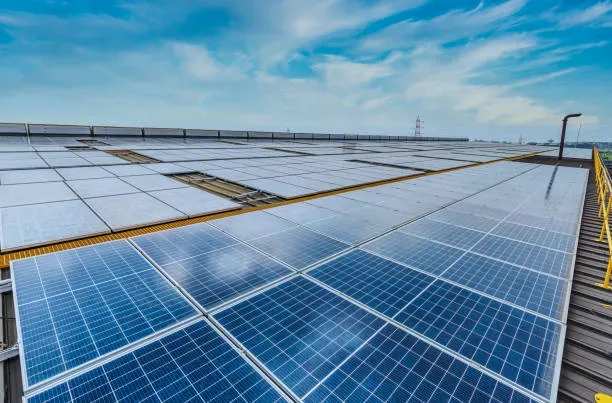BAGHDAD, Dec. 11, 2023 / — In a strategic move toward harnessing the untapped potential of Iraq’s solar landscape, Sungrow is taking the lead in shaping the nation’s green energy sector.
Iraq’s Minister of Oil, Ihsan Abdul Jabbar, stressed the importance for Arab countries to prioritize high-efficiency, low-cost energy production to foster a modern economy. The country has set a target to install 12 gigawatts of renewable energy, accounting for 33% of the country’s electricity by 2030.
Spearheading this initiative, Lei Wu, the Acting Chief Operating Officer of Sungrow MENA region, emphasized the significance of bringing cutting-edge technology to tackle Iraq’s longstanding electricity shortage, ultimately enhancing the availability of reliable and high-quality electricity for its residents.
Urgent energy transition needs calls for international cooperation
Iraq faces a substantial electricity shortage, with nearly one-third of its supply coming from imports, including natural gas, according to Reuters.
With 8 to 10 hours of daily sunshine and an annual average of 3,000 to 3,650 hours, the region is poised for large-scale PV deployment.
Wu outlines three key avenues for PV expansion in Iraq: utility-scale power plants, commercial and industrial (C&I) installations, and residential solutions.
Iraq’s $680 million fund for clean energy development supports these efforts, demonstrating the government’s ambition to build a green economy and foster international cooperation aiming for this goal.
Fragile grid demands innovative solutions
As the demand for solar power grows in Iraq, Iraq emerges as a burgeoning solar market. However, the underdeveloped power grid in Iraq presents challenges that demand higher standards for both products and technologies. Solar projects operating under Iraq’s weak grid, whether serving as backup power sources during outages or directly connecting to the grid, have the potential to affect the overall stability of the grid, worsening an already precarious situation.
Lei Wu emphasizes, “Tailoring our products and solutions to diverse requirements is crucial. For example, when a project requires connection to a weak grid, our focus is on providing robust grid support. This involves a seamless integration of PV and energy storage to enhance the stability and optimize consumption ratios. Alternatively, in off-grid scenarios or as a backup power source, our goal is to ensure seamless collaboration between PV and energy storage for maximum efficiency.”
A weak grid signifies a low Short Circuit Ratio (SCR), making it vulnerable to grid failure or disconnection issues. Currently, the minimum SCR required by the grid is 1.5, and the lower the SCR value inverters are compatible with, the more robust the grid supports after connection.
Notably, Sungrow, leveraging its technological prowess, has developed a “1+X” modular inverter and SG350HX string inverter, passing SCR tests at 1.018 and 1.1, respectively. In terms of energy storage, Sungrow employs Stem Cell Grid technology, achieving 0ms grid connection and disconnection switching. This ongoing exploration of boundaries serves to comprehensively enhance grid support capabilities.
“We have extensive experience in the MENA region. Previously, we participated in the construction of an 800 MW solar project for the Qatar World Cup. At that time, the integration of large-scale green energy into the Qatar power grid served as a test, and with the backing of advanced Chinese technology, the project proceeded smoothly. This success has bolstered our confidence in venturing into the Iraqi market”, said Wu.
Provide localized services
“Venturing into international markets” is intrinsic to Chinese PV enterprises, yet breaking new ground is far from straightforward. Operating abroad not only scrutinizes technology and products, but also the effectiveness of local sales networks, post-sales teams, and service response capabilities. For seasoned players like Sungrow, however, this challenge is effortlessly managed.
Since its establishment in 1997, Sungrow has been dedicated to renewable energy power generation. Whether considering product quality, scale, or market coverage, the company stands as a global industry leader. Up to now, in addition to its traditional strength in solar inverters, Sungrow has diversified its business portfolio to include energy storage systems, renewable energy hydrogen production systems, smart operation and maintenance, EV-charging, investment and development in renewable energy power plants, and new energy automotive driving systems, etc.
Wu told the reporter, “Every enterprise may face challenges of not fitting the local conditions while exploring new markets. To overcome this, concerted efforts are necessary. Firstly, we must understand the local business environment and social culture, do thorough groundwork in advance, and avoid potential risk factors.”
“Secondly, we need a strong sales and service network for timely customer response. Currently, our business reaches 150+ countries and regions, committed to addressing overseas customer needs within 48 hours. Sungrow follows a global development strategy, with branches and sales networks in the MENA region for localized services. This enhances cooperation with local customers, aiding in expanding the Iraqi market,” he added.
Wu further emphasized that, “Exploring new markets is about establishing roots. The deeper the roots, the more abundant the growth.”
In the first nine months of this year, Sungrow marked a revenue of RMB 46.415 billion, surpassing the annual revenue of RMB 40.257 billion in 2022, setting a new record. As per consulting firm S&P Global Commodity Insights, Sungrow has maintained its global lead by shipping 77 GW of PV inverters in 2022. Additionally, its delivery of energy storage systems exceeded 7.7 GWh in the same year.
View original content:https://www.prnewswire.co.uk/news-releases/sungrow-spearheads-iraqs-renewable-energy-revolution-302010930.html



